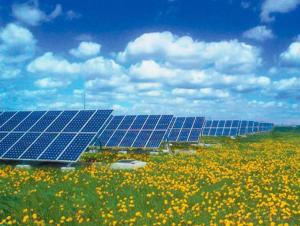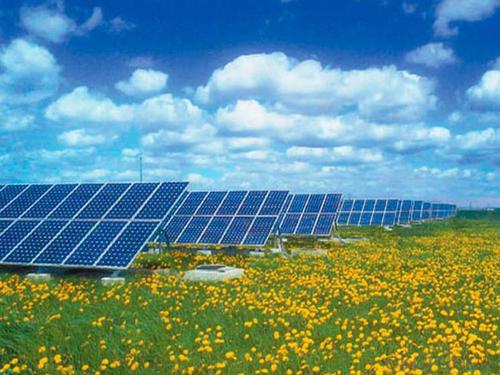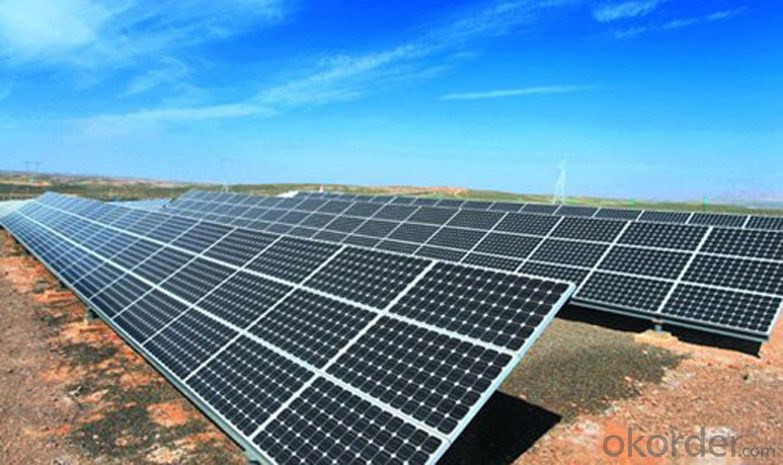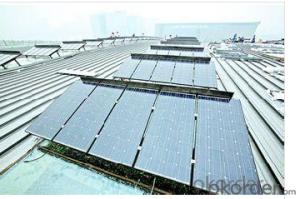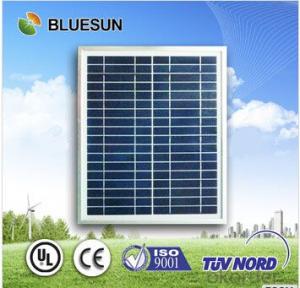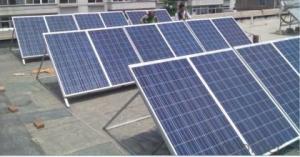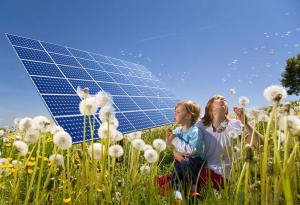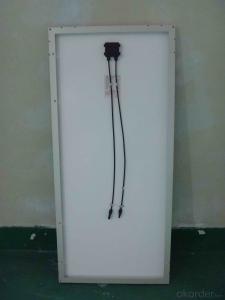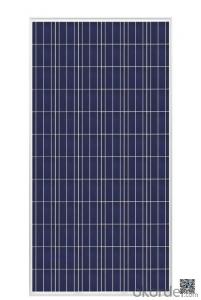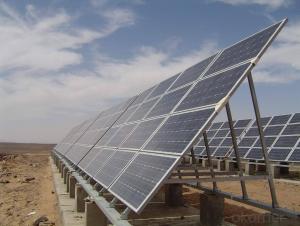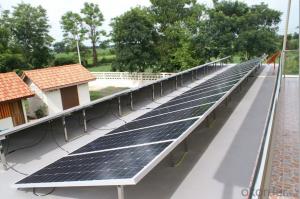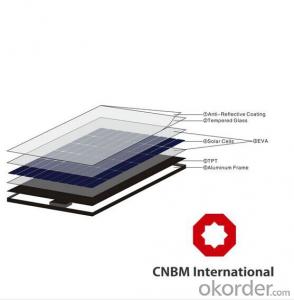Large Solar Panels in Winter Snow - Purchase from China Manufacturer
- Loading Port:
- Shanghai
- Payment Terms:
- TT OR LC
- Min Order Qty:
- 7875 watt
- Supply Capability:
- 10000000 watt/month
OKorder Service Pledge
OKorder Financial Service
You Might Also Like
Specification
Solar Module Summarize
Solar Module is the core part of solar PV power systems, also is the highest value part of it. The function of Solar Module is to convert the sun's radiation to electrical energy, or transfer it to battery and store in it, or to drive the load running.
The Product has been widely used in space and ground, it mainly used for power generation systems, charging systems, road lighting and traffic signs areas. It could offer a wide range of power and voltage, and with high conversion efficiency, and long service life.
Technical Parameter:
Good Quality 185W Solar Panel | |
Peak Power-Pmax(W) | 185W |
Open Circuit Voltage-Voc(V) | 44.2 |
Maximum Power Voltage-Vmp(V) | 36 |
Short Circuit Current-Isc(A) | 5.4 |
Maximum Power Current-Imp(A) | 5 |
Maximum System Voltage | 1000V DC |
Maximum Series Fuse Rating | 10A |
Power Tolerance | -1~+3% |
Temperature Coefficients of Pmax | -0.45%/℃ |
Temperature Coefficients of Voc | -0.348%/℃ |
Temperature Coefficients of Isc | 0.031%/℃ |
Nominal Operating Cell Temperature | 44.5±2℃ |
Standard Testing Condition(STC) | Irradiance:1000W/m²;Temperature:25℃;AM=1.5 |
Qualification Test Parameters | |
Operating Temperature | -40℃~+85℃ |
Storage Temperature | -40℃~+85℃ |
Pressure Bearing | ≥5400Pascal/m² |
Wind Bearing | ≥5400Pascal/m² |
Mechanical Characteristics | |
Cell Size | Mono 125*125mm±0.5 |
No.of Cells | 72pcs(6*12) |
Dimension | 1580*808*40mm |
Weight | 15.5Kg |
Glass | 3.2mm High Transmission,Low Iron |
Frame | Anodized Aluminum Alloy |
Junction Box | IP65Rated |
Internal Diodes | 3 Bypass Diodes |
Cable | 1*4.0mm² Length 900mm |
Production Flow :
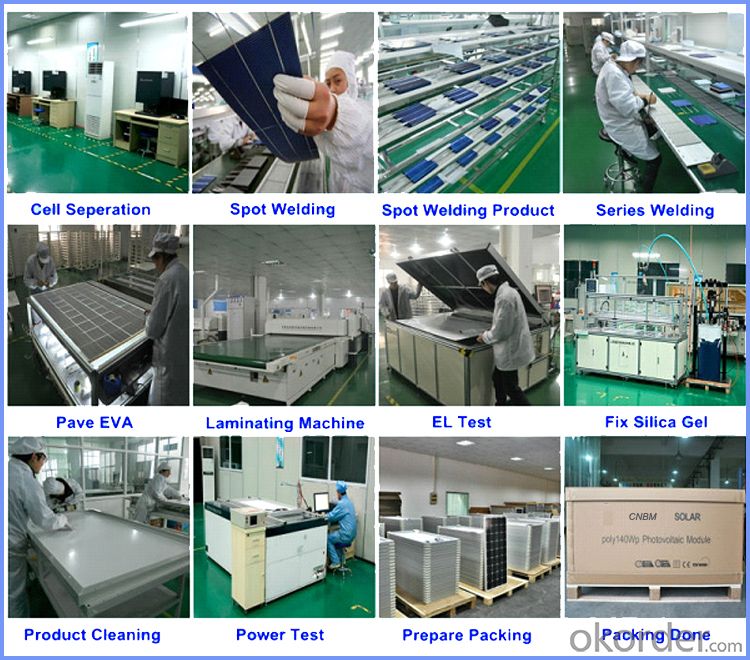
Product Show:
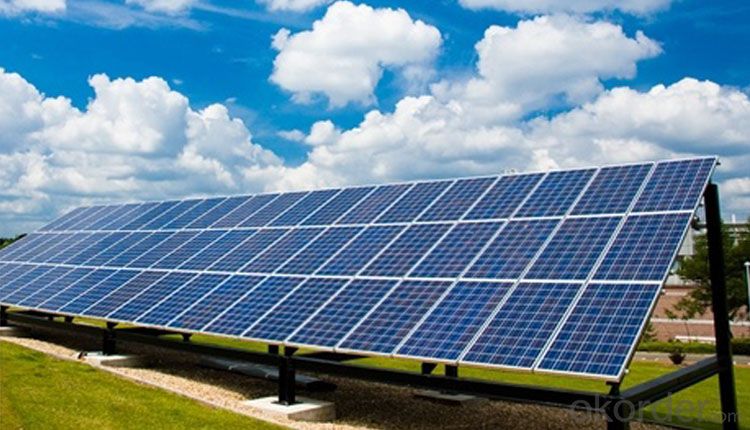
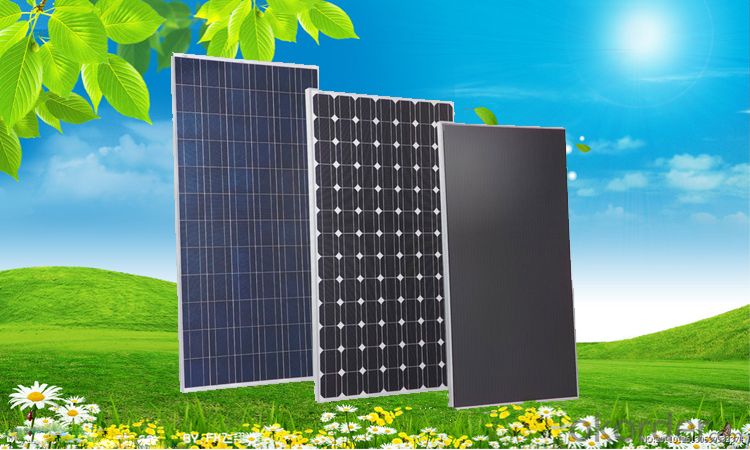
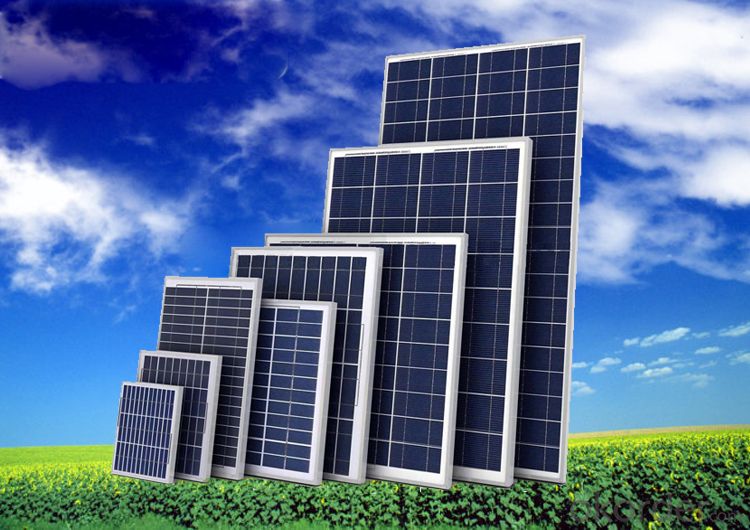
Warranty
Good Quality 185W Solar Panel Manufacture from China
For c-Si panel: 25years output warranty for no less than 80% of performance, 10 years output warranty for no less than 90% of performance. Free from material and workmanship defects within 5 years.
For a-Si panel: 20 years output warranty for no less than 80% of performance, 10 years output warranty for no less than 90% of performance. Free from material and workmanship defects within 2 years.
- Q: Can I add more solar panel let say up to 200 watt and adding two 2 volts battery using the same charges controller and power inverter?
- If you put a black panel on the ground or on your house and don't connect it to anything, it will absorb solar energy (heat) during daylight and release it at night (radiation). Not exactly. Assuming the black panel establishes an equilibrium temperature, it's going to be losing exactly as much heat as it's receiving during the day. Some will radiate out into space, some will conduct or convect into the atmosphere. As a wild guess, maybe 50/50. If you hook up a solar panel in the same place but hook it up to batteries, charge the batteries during sunlight hours and using that energy to electrically heat the home at night. The panels will absorb solar energy during the day but will convert that to electrical energy in the batteries instead of radiating it back into space at night. The panels are only about 4% efficient, so it's the same situation as the pure black panel for 86% of the energy. The remaining 4% will get stored in the batteries and then converted to heat at night. That heat will eventually leak out of the house and warm up the Earth a tiny bit. I think it's much the same situation either way. With the black panel the energy gets radiated / conducted/convected right away. With the solar panel a small percentage is stored and not so much is radiated, mostly conducted and convected. You're partly right as a black panel is going to radiate more into space than a house. But you're taking about maybe some day about 4% of % of the differening radiation/convection/conduction fraction, of the Earth's surface area. Probably not significant.
- Q: Do solar panels require cleaning?
- Yes, solar panels do require cleaning to maintain their efficiency. Dust, dirt, bird droppings, and other debris can accumulate on the surface of the panels, blocking sunlight and reducing their ability to generate electricity. Regular cleaning helps ensure optimal performance and maximizes the energy output of solar panels.
- Q: Can solar panels be installed on ground-mounted structures?
- Yes, solar panels can be installed on ground-mounted structures. In fact, ground-mounted solar panel systems are a popular choice for residential, commercial, and utility-scale projects. They offer flexibility in terms of location, orientation, and scalability, making them an ideal option for areas with limited roof space or shading issues. Ground-mounted structures can be customized to optimize solar panel angles for maximum energy production and are easier to install and maintain compared to rooftop systems.
- Q: Can solar panels be installed on a gas station or fueling facility?
- Yes, solar panels can be installed on a gas station or fueling facility. In fact, many gas stations and fueling facilities have started installing solar panels as a means to reduce their carbon footprint and decrease their reliance on traditional energy sources. Solar panels can provide renewable energy to power the facility's operations, including lighting, pumps, and other electrical systems. Additionally, solar installations can help gas stations and fueling facilities save on electricity costs in the long run.
- Q: what parts and tool do i need to build and connect a solar electric panel to my home
- Dear Matadora, Very good, good, good step to change your home electric supply to solar cell, because in long run, solar cell is cheaper. First you have to consider Power need for your house, eg. 200W, then you go to sellers and choose one with lowest price but best quality. After that you should assemble/attach your solar panel in place that gets most Sunlight, most probably in your roof. Attach them tightly, avoid burglar. Original solar cell current is DC. Current from solar cell placed first in several car batteries, so you could use electricity in night either. After that if your home appliances use DC, you could directly connect your appliances to batteries. But if your appliances need AC, current should be converted first from DC to AC use DC to AC converter. Car battery used to have 2 Volt DC. So if you need 220VAC, after DC converted into AC, then passed through transformer to increase voltage. Thank you very much Matadora.
- Q: Can solar panels be used to power a disaster relief operation?
- Yes, solar panels can be used to power a disaster relief operation. Solar panels are a viable and sustainable source of energy that can be deployed quickly in disaster-stricken areas. They can provide electricity for charging communication devices, running medical equipment, powering lighting systems, and supporting other essential operations during relief efforts. Additionally, solar panels are independent of existing power grids and can be set up in remote or inaccessible locations, making them an excellent solution for providing energy in emergency situations.
- Q: Can solar panels be used for powering outdoor recreational vehicles?
- Yes, solar panels can be used for powering outdoor recreational vehicles such as RVs, campers, and boats. They provide a convenient and eco-friendly way to generate electricity for various appliances and systems in these vehicles, including lighting, refrigeration, heating, and charging electronic devices. Solar panels can harness the sun's energy to charge batteries, which can then be used to power the vehicle's electrical needs, making it a sustainable and cost-effective option for outdoor enthusiasts.
- Q: 3.8 volts is required to fully charge a battery. But at 3.8 volts, the battery can be overcharged without the use of a controller correct? What if I don't care if the battery is fully charged? In the case of our family boat, I just installed a new radio, so I'm a little worried about power consumption. So now for the real question; If I hook a 2 volt panel to the batteries, do I need to worry about overcharging them? Or will the batteries stop the charging process once they reach 2 volt?I built the panel myself, it's 8 volts at 3.5 amps open circuit. I have tabs at every 3 volt increment on the panel so that I can use less voltage than 8 if I want to power something directly, (ex:2 volt radio)So I'm using the 2 volt tab at 3.5 amps(approx) for a total of approx 48 watts
- It is cheaper to have a solar regulator to extend the battery lifespan. A lead acid battery can vent hydrogen if charged too much and run out of electrolytes. The battery would cost more than a $30 5 amp solar regulator.
- Q: How do solar panels affect roof weight load?
- Solar panels can increase the weight load on a roof, but modern solar panel systems are designed to distribute the weight evenly and not exceed the load capacity of the roof.
- Q: when building a solar panel should the diode be on the positive or negative sidelittle more detail i just built a solar panel and im running it to a grid tie converter should i put diodes in if i add another panel or are they only for battery systems?
- the blocking diode goes on the positive side
Send your message to us
Large Solar Panels in Winter Snow - Purchase from China Manufacturer
- Loading Port:
- Shanghai
- Payment Terms:
- TT OR LC
- Min Order Qty:
- 7875 watt
- Supply Capability:
- 10000000 watt/month
OKorder Service Pledge
OKorder Financial Service
Similar products
Hot products
Hot Searches
Related keywords
